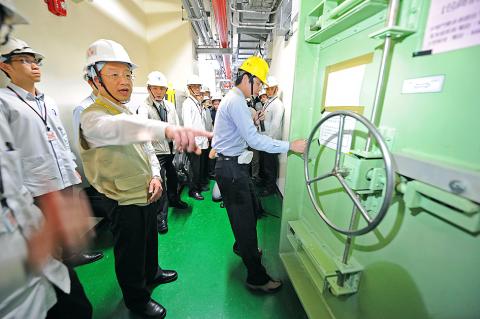Contradicting his previous pledge that the proposed referendum on the Fourth Nuclear Power Plant in New Taipei City’s (新北市) Gongliao District (貢寮) would not be held until the plant’s operational safety could be guaranteed, Premier Jiang Yi-huah (江宜樺) yesterday said he was not sure about the matter.
Jiang said he was unable to say with absolute certainty that the referendum would only be held once the facility passes a safety inspection because it is impossible to know how long a safety check would take, as they do not have a predetermined duration. In addition, the Central Election Commission, not the Cabinet, has the mandate to set the referendum date, he said.
Jiang made the remarks in response to media queries after he made a tour of the power plant yesterday and listened to a briefing on the safety inspection plan.

Photo: CNA
Jiang has reiterated on several occasions that it would not be necessary to stage a referendum if safe operation of the Fourth Nuclear Power Plant remains a concern because in that case the government would not issue an operating license once it is completed and therefore it could not operate.
The change in Jiang’s position came after President Ma Ying-jeou (馬英九) said in a recent interview with the Chinese-language Apple Daily that the safety inspection and referendum should not be linked.
During the visit, representatives of Taiwan Power Co (Taipower, 台電), the plant’s operator, sought to reassure Jiang and reporters that the Gongliao plant would be better able to withstand natural disasters than Japan’s Fukushima Dai-ichi nuclear power plant — which experienced a meltdown after the March 11, 2011, tsunami and earthquake — in seven aspects.
Among those was a 48,000-tonne fresh water tank, which the Fukushima Dai-ichi plant was not equipped with, that would hold enough water to cool the rectors for three days in an emergency scenario, Taipower said.
The Fourth Nuclear Power Plant also has two backup power sources in case of power outages, which the Japanese plant did not, it said.
Plant deputy general manager Lin Rong-yi (林榮宜), who has worked at power plants for 30 years, said he was unhappy that the plant’s design and construction had been labeled as “patchwork.”
“For those of us who specialize in nuclear technology, it’s called technology integration,” Lin said.
Any high-tech product, such as a nuclear power plant, is a synthesis of advanced technologies; even a smartphone is composed of components manufactured by many different firms, Lin said.

CHAOS: Iranians took to the streets playing celebratory music after reports of Khamenei’s death on Saturday, while mourners also gathered in Tehran yesterday Iranian Supreme Leader Ayatollah Ali Khamenei was killed in a major attack on Iran launched by Israel and the US, throwing the future of the Islamic republic into doubt and raising the risk of regional instability. Iranian state television and the state-run IRNA news agency announced the 86-year-old’s death early yesterday. US President Donald Trump said it gave Iranians their “greatest chance” to “take back” their country. The announcements came after a joint US and Israeli aerial bombardment that targeted Iranian military and governmental sites. Trump said the “heavy and pinpoint bombing” would continue through the week or as long

TRUST: The KMT said it respected the US’ timing and considerations, and hoped it would continue to honor its commitments to helping Taiwan bolster its defenses and deterrence US President Donald Trump is delaying a multibillion-dollar arms sale to Taiwan to ensure his visit to Beijing is successful, a New York Times report said. The weapons sales package has stalled in the US Department of State, the report said, citing US officials it did not identify. The White House has told agencies not to push forward ahead of Trump’s meeting with Chinese President Xi Jinping (習近平), it said. The two last month held a phone call to discuss trade and geopolitical flashpoints ahead of the summit. Xi raised the Taiwan issue and urged the US to handle arms sales to

State-run CPC Corp, Taiwan (CPC, 台灣中油) yesterday said that it had confirmed on Saturday night with its liquefied natural gas (LNG) and crude oil suppliers that shipments are proceeding as scheduled and that domestic supplies remain unaffected. The CPC yesterday announced the gasoline and diesel prices will rise by NT$0.2 and NT$0.4 per liter, respectively, starting Monday, citing Middle East tensions and blizzards in the eastern United States. CPC also iterated it has been reducing the proportion of crude oil imports from the Middle East and diversifying its supply sources in the past few years in response to geopolitical risks, expanding

Pro-democracy media tycoon Jimmy Lai’s (黎智英) fraud conviction and prison sentence were yesterday overturned by a Hong Kong court, in a surprise legal decision that comes soon after Lai was jailed for 20 years on a separate national security charge. Judges Jeremy Poon (潘兆初), Anthea Pang (彭寶琴) and Derek Pang (彭偉昌) said in the judgement that they allowed the appeal from Lai, and another defendant in the case, to proceed, as a lower court judge had “erred.” “The Court of Appeal gave them leave to appeal against their conviction, allowed their appeals, quashed the convictions and set aside the sentences,” the judges